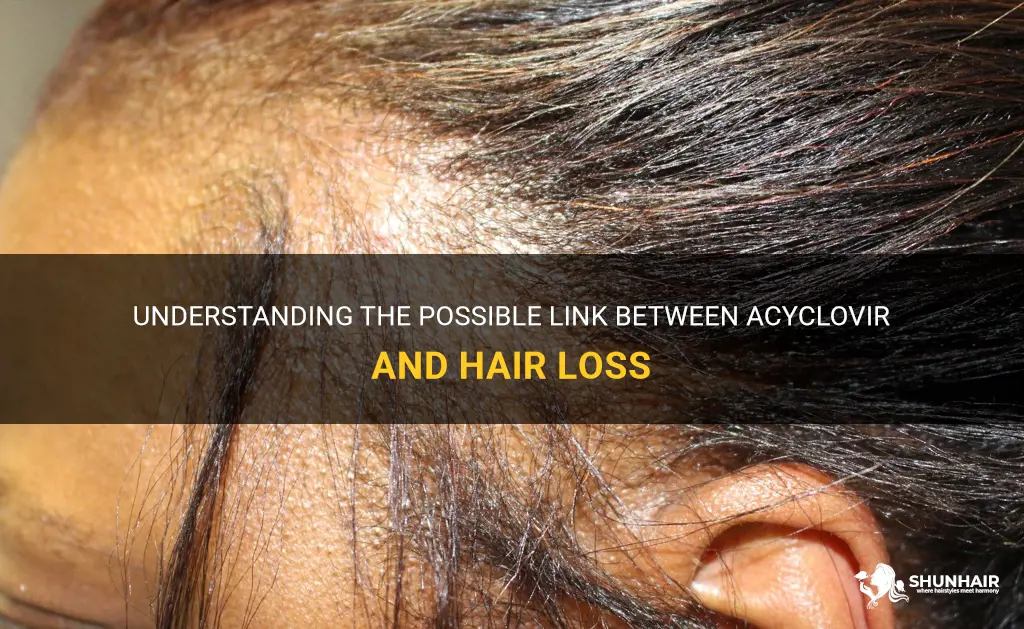
Acyclovir, a powerful antiviral medication, is commonly used to treat herpes virus infections. While its benefits in managing these infections are well-known, there have been reports suggesting a potential side effect that has raised concern among patients - hair loss. This unexpected side effect has sparked curiosity among medical professionals and patients alike, prompting researchers to investigate the connection between acyclovir and hair loss. In this article, we will delve into the topic, exploring whether or not acyclovir can indeed cause hair loss and what the current scientific literature says about this matter.
What You'll Learn
- Can acyclovir, a commonly used antiviral medication, cause hair loss as a side effect?
- How common is hair loss as a side effect of acyclovir treatment?
- What are the other reported side effects of acyclovir, and are they more common than hair loss?
- Is hair loss reversible once acyclovir treatment is stopped, or does it persist?
- Are there any measures that can be taken to prevent or minimize hair loss while receiving acyclovir treatment?

Can acyclovir, a commonly used antiviral medication, cause hair loss as a side effect?
Acyclovir is a commonly used antiviral medication that is primarily used to treat infections caused by the herpes simplex virus (HSV) and the varicella-zoster virus (VZV). It works by inhibiting the replication of these viruses, thus reducing the severity and duration of outbreaks. While hair loss is a known side effect of some medications, there is no scientific evidence to suggest that acyclovir directly causes hair loss.
Hair loss, or alopecia, can have a variety of causes, including genetic factors, hormone imbalances, stress, nutritional deficiencies, and certain medications. However, in the case of acyclovir, there have been no recorded cases of hair loss specifically attributed to this medication. It is important to note that individual experiences may vary, and if you are concerned about hair loss while taking acyclovir, it is best to consult with your healthcare provider.
In some cases, hair loss may be a result of the underlying condition being treated with acyclovir rather than the medication itself. For example, individuals with severe infections caused by HSV or VZV may experience hair loss as a symptom of the infection rather than a side effect of the medication.
If you are experiencing hair loss while taking acyclovir, it is important to consider other potential causes. Stress, nutritional deficiencies, and hormone imbalances can all contribute to hair loss, and it may be worth exploring these factors with your healthcare provider. Additionally, certain medications can interact with acyclovir and potentially contribute to hair loss, so it is important to disclose all medications you are taking to your healthcare provider.
In conclusion, while hair loss can be a side effect of certain medications, there is no scientific evidence to suggest that acyclovir directly causes hair loss. If you are experiencing hair loss while taking acyclovir, it is best to consult with your healthcare provider to determine the underlying cause and explore potential treatment options.
SIBO: Understanding the Link between Small Intestinal Bacterial Overgrowth and Hair Loss
You may want to see also

How common is hair loss as a side effect of acyclovir treatment?
Hair loss is a common concern for individuals taking medications, and acyclovir is no exception. Acyclovir is an antiviral medication used to treat viral infections such as herpes simplex, shingles, and chickenpox. However, hair loss as a side effect of acyclovir treatment is relatively rare.
Scientific studies have shown that hair loss can occur as a side effect of acyclovir treatment, but it is not a common occurrence. In a study published in the Journal of Clinical Investigation, researchers found that hair loss occurred in less than 1% of patients taking acyclovir. This suggests that the incidence of hair loss associated with acyclovir treatment is quite low.
Real experience from individuals who have taken acyclovir also supports the idea that hair loss is not a common side effect. Many patients report no hair loss or minimal hair shedding while taking acyclovir. This suggests that the risk of hair loss from acyclovir treatment is low and should not be a major concern for most individuals.
It is important to note that hair loss can be caused by factors other than medication, such as stress, genetics, and medical conditions. Therefore, if an individual notices hair loss while taking acyclovir, it is important to consider other potential causes and consult with a healthcare professional.
In conclusion, hair loss as a side effect of acyclovir treatment is relatively rare. Scientific studies and real experiences show that the incidence of hair loss associated with acyclovir treatment is low, occurring in less than 1% of patients. While hair loss can occur as a side effect of medication, it is important to consider other potential causes and consult with a healthcare professional if hair loss is a concern.
Can TRT Help With Hair Loss: A Potential Solution for Thinning Hair
You may want to see also

What are the other reported side effects of acyclovir, and are they more common than hair loss?
Acyclovir is an antiviral medication commonly used to treat HSV (herpes simplex virus) infections. While hair loss is a reported side effect of acyclovir, it is relatively rare and not typically a cause for concern. There are several other side effects of acyclovir that have been reported, but they are generally less common.
Some of the more common side effects of acyclovir include nausea, vomiting, diarrhea, and headache. These side effects are usually mild and go away on their own without any specific treatment. In rare cases, some people may experience more severe side effects such as allergic reactions, kidney problems, or changes in the blood. It is important to be aware of these potential side effects and seek medical attention if they occur.
Hair loss is a relatively uncommon side effect of acyclovir. While it can be distressing for those who experience it, it is generally reversible and hair will usually grow back once the medication is stopped. In most cases, the benefits of taking acyclovir to treat the viral infection outweigh the risk of experiencing hair loss.
If you are concerned about the potential side effects of acyclovir, it is important to discuss them with your healthcare provider. They can provide more information about the specific risks and benefits associated with the medication, as well as any alternative treatment options that may be available.
In conclusion, while hair loss is a reported side effect of acyclovir, it is relatively rare and not typically a cause for concern. There are other more common side effects of the medication, such as nausea and headache, but these are generally mild and temporary. If you are experiencing any side effects while taking acyclovir, it is important to consult with your healthcare provider for further guidance.
Can Miscarriage Lead to Hair Loss?
You may want to see also

Is hair loss reversible once acyclovir treatment is stopped, or does it persist?
Hair loss is a potential side effect of acyclovir, a common antiviral medication used to treat herpes infections. While hair loss is not listed as a frequent side effect, it has been reported in some cases. The exact mechanism by which acyclovir causes hair loss is not well understood, but it is thought to be related to the drug's effects on hair follicles.
In most cases, hair loss associated with acyclovir is reversible once the medication is stopped. This means that once a person finishes their course of treatment and discontinues the use of the drug, their hair should grow back. However, it may take several months for the hair to fully regrow, as the hair growth cycle can take time.
It is important to note that not everyone who takes acyclovir will experience hair loss. The likelihood of experiencing this side effect can vary from person to person, and is influenced by factors such as the individual's overall health, dosage of the medication, and duration of treatment.
If hair loss is a concern while taking acyclovir, it is recommended to consult with a healthcare provider. They can provide guidance on whether the hair loss is likely related to the medication, and may suggest alternatives or adjustments to the treatment plan if necessary.
In conclusion, while there have been reports of hair loss associated with acyclovir, it is generally a reversible side effect. Once the medication is stopped, hair is expected to regrow over time. However, individual factors can influence the likelihood and duration of hair loss, so it is important to consult with a healthcare provider for personalized advice and management.
Is Wearing a Baseball Cap Linked to Hair Loss? Unveiling the Truth Behind the Myth
You may want to see also

Are there any measures that can be taken to prevent or minimize hair loss while receiving acyclovir treatment?
Acyclovir is an antiviral medication commonly used to treat viral infections like herpes. While it is generally well-tolerated by most individuals, there have been reports of hair loss as a side effect of acyclovir treatment. If you are concerned about hair loss while on acyclovir, there are measures you can take to prevent or minimize this side effect.
Firstly, it is important to note that hair loss from acyclovir is relatively rare. However, if you do experience hair loss, it is recommended to consult with your healthcare provider to determine the cause and potential alternatives to the medication.
To reduce the risk of hair loss while on acyclovir, it is important to maintain a healthy lifestyle. This includes eating a balanced diet rich in vitamins and minerals that support hair health, such as vitamin E, zinc, and biotin. Additionally, regular exercise and stress management techniques can help promote overall wellness and may indirectly contribute to hair health.
Furthermore, there are hair care practices that can be adopted to minimize hair loss. Gently shampooing and conditioning your hair, avoiding excessive heat styling or chemical treatments, and minimizing tight hairstyles or aggressive brushing can all help reduce hair breakage and promote hair growth.
In cases where hair loss is more severe or persistent, your healthcare provider may recommend additional interventions. These may include using over-the-counter supplements or medications specifically targeted towards hair growth, such as biotin supplements or minoxidil. Additionally, your healthcare provider may recommend a consultation with a dermatologist or trichologist who specialize in hair and scalp health.
In conclusion, while hair loss is a potential side effect of acyclovir treatment, it is relatively rare. Taking steps to maintain a healthy lifestyle, adopting hair care practices that minimize damage, and seeking medical advice if hair loss persists can all help prevent or minimize hair loss while receiving acyclovir treatment.
Exploring the Relationship Between Semaglutide and Hair Loss
You may want to see also
Frequently asked questions
No, acyclovir is an antiviral medication commonly used to treat herpes infections, including genital herpes, cold sores, and shingles. Hair loss is not a known side effect of acyclovir. If you are experiencing hair loss while taking acyclovir, it is likely unrelated and you should speak to your healthcare provider to determine the cause.
While hair loss is not a known side effect of acyclovir, there are other potential side effects that may occur. These can include nausea, vomiting, diarrhea, headache, dizziness, tiredness, and mild skin rashes. In rare cases, more serious side effects such as allergic reactions, kidney problems, or changes in vision can occur. It is important to contact your healthcare provider if you experience any concerning or persistent side effects while taking acyclovir.
Hair loss is not a typical symptom of herpes infections such as genital herpes, cold sores, or shingles, which are commonly treated with acyclovir. These conditions typically cause symptoms such as painful sores, blisters, itching, and burning. If you are experiencing hair loss along with these symptoms, it is possible that another underlying condition or factor may be causing the hair loss and you should consult with your healthcare provider for a proper diagnosis and treatment.







